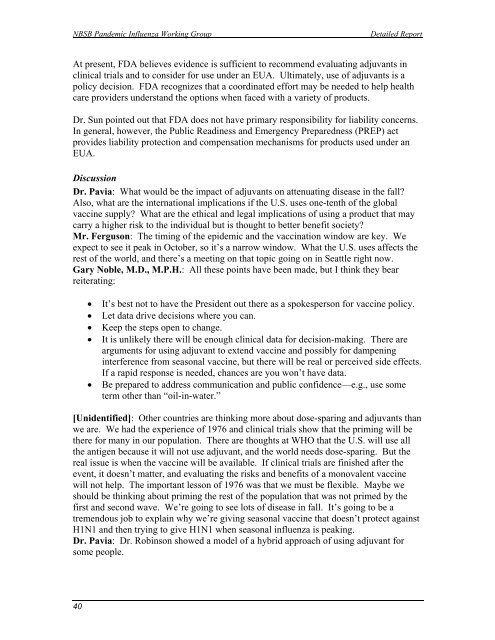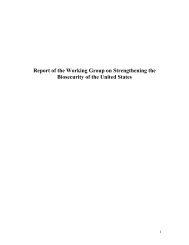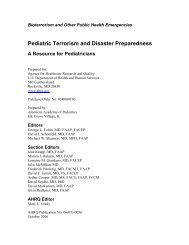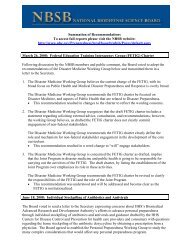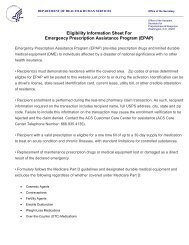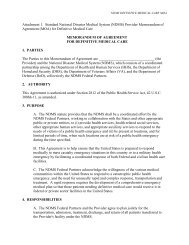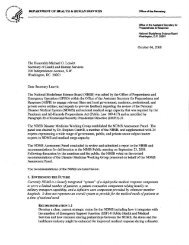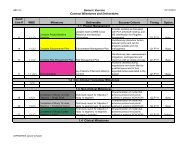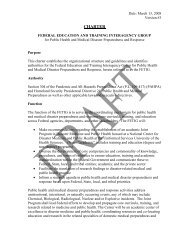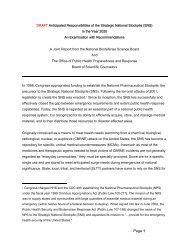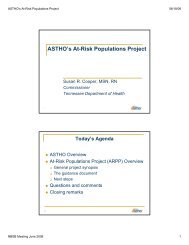H1N1 COUNTERMEASURES STRATEGY AND ... - PHE Home
H1N1 COUNTERMEASURES STRATEGY AND ... - PHE Home
H1N1 COUNTERMEASURES STRATEGY AND ... - PHE Home
You also want an ePaper? Increase the reach of your titles
YUMPU automatically turns print PDFs into web optimized ePapers that Google loves.
NBSB Pandemic Influenza Working Group<br />
Detailed Report<br />
At present, FDA believes evidence is sufficient to recommend evaluating adjuvants in<br />
clinical trials and to consider for use under an EUA. Ultimately, use of adjuvants is a<br />
policy decision. FDA recognizes that a coordinated effort may be needed to help health<br />
care providers understand the options when faced with a variety of products.<br />
Dr. Sun pointed out that FDA does not have primary responsibility for liability concerns.<br />
In general, however, the Public Readiness and Emergency Preparedness (PREP) act<br />
provides liability protection and compensation mechanisms for products used under an<br />
EUA.<br />
Discussion<br />
Dr. Pavia: What would be the impact of adjuvants on attenuating disease in the fall?<br />
Also, what are the international implications if the U.S. uses one-tenth of the global<br />
vaccine supply? What are the ethical and legal implications of using a product that may<br />
carry a higher risk to the individual but is thought to better benefit society?<br />
Mr. Ferguson: The timing of the epidemic and the vaccination window are key. We<br />
expect to see it peak in October, so it’s a narrow window. What the U.S. uses affects the<br />
rest of the world, and there’s a meeting on that topic going on in Seattle right now.<br />
Gary Noble, M.D., M.P.H.: All these points have been made, but I think they bear<br />
reiterating:<br />
<br />
<br />
<br />
<br />
<br />
It’s best not to have the President out there as a spokesperson for vaccine policy.<br />
Let data drive decisions where you can.<br />
Keep the steps open to change.<br />
It is unlikely there will be enough clinical data for decision-making. There are<br />
arguments for using adjuvant to extend vaccine and possibly for dampening<br />
interference from seasonal vaccine, but there will be real or perceived side effects.<br />
If a rapid response is needed, chances are you won’t have data.<br />
Be prepared to address communication and public confidence—e.g., use some<br />
term other than “oil-in-water.”<br />
[Unidentified]: Other countries are thinking more about dose-sparing and adjuvants than<br />
we are. We had the experience of 1976 and clinical trials show that the priming will be<br />
there for many in our population. There are thoughts at WHO that the U.S. will use all<br />
the antigen because it will not use adjuvant, and the world needs dose-sparing. But the<br />
real issue is when the vaccine will be available. If clinical trials are finished after the<br />
event, it doesn’t matter, and evaluating the risks and benefits of a monovalent vaccine<br />
will not help. The important lesson of 1976 was that we must be flexible. Maybe we<br />
should be thinking about priming the rest of the population that was not primed by the<br />
first and second wave. We’re going to see lots of disease in fall. It’s going to be a<br />
tremendous job to explain why we’re giving seasonal vaccine that doesn’t protect against<br />
<strong>H1N1</strong> and then trying to give <strong>H1N1</strong> when seasonal influenza is peaking.<br />
Dr. Pavia: Dr. Robinson showed a model of a hybrid approach of using adjuvant for<br />
some people.<br />
40


